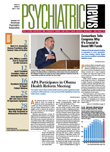In
DSM-IV mental disorders are essentially categorized as present or absent on the basis of a set of symptoms that characterize them. However, psychiatric patients often present with signs and symptoms of multiple mental illnesses even if they meet criteria for only one disorder. At times, these symptoms can be severe. This clinical reality is not well reflected in
DSM-IV. Thus some psychiatric scientists developing
DSM-V argued at a recent symposium that
DSM-V should include dimensional assessments of psychopathology along with categorical diagnoses (see
Researchers Lay Out Challenges Facing Developers of DSM-V).
A study underscoring the feasibility and desirability of such a strategy was also reported at the symposium at a poster session.
The study was conducted by the APA Practice Research Network (PRN) and the American Psychiatric Institute for Research and Education (APIRE) and was funded by the American Psychiatric Foundation. The lead investigator was Joyce West, Ph.D., senior research scientist in the PRN. The senior investigator was Darrel Regier, M.D., director of APA's Office of Research and executive director of APIRE.
The study included some 3,000 patients with various mental disorders, notably schizophrenia, major depression, or bipolar disorder, as well as the psychiatrists caring for them. The psychiatrists not only listed all of the DSM-IV-TR Axis I and Axis II disorders for which they had diagnosed these patients, but also rated the severity of the patients' symptoms on a simple dimensional scale.
When the researchers analyzed the results, they found that when the severity of patients' symptoms was taken into consideration, a more complex, yet also a more comprehensive, snapshot was created of the patients' psychopathology than when the patients were simply diagnosed on the presence or absence of symptoms.
For example, 62 percent of patients with major depression were found to have moderate to severe anxiety symptoms, although only 29 percent of them had been diagnosed with an anxiety disorder. Fifty-two percent of patients with a substance use disorder were found to have moderate to severe depressive symptoms, although only 27 percent had been diagnosed with a depressive disorder. Twelve percent of patients with posttraumatic stress disorder were found to have moderate to severe psychotic symptoms, although only 6 percent had been diagnosed with a psychotic disorder.
In other words, the findings appeared to reflect that patients often had signs and symptoms of multiple mental illnesses, even if they met criteria for just one disorder.
“Two additional independent studies have confirmed these findings,” the researchers noted, “and support the feasibility and utility of using dimensional measures of psychopathology in routine practice.”
